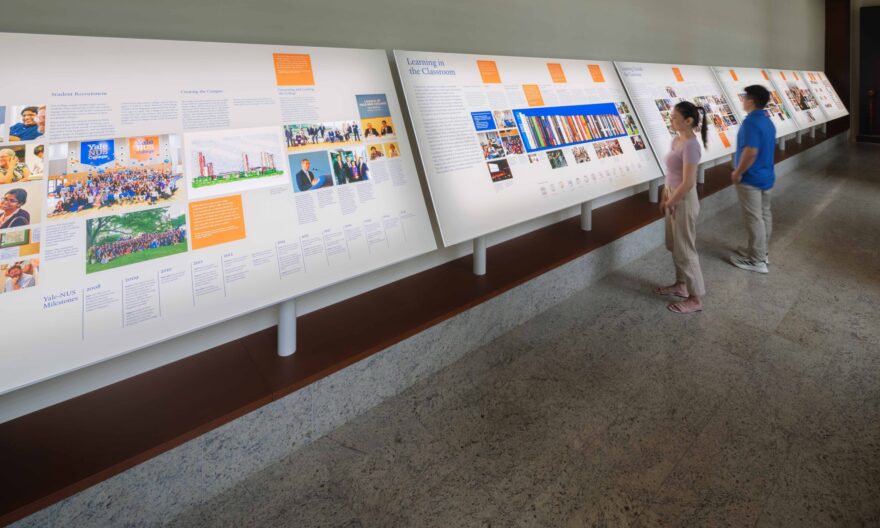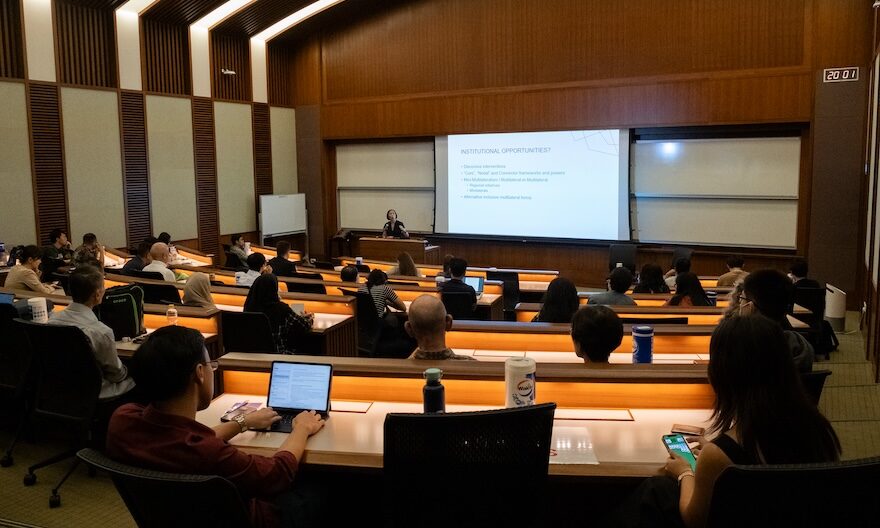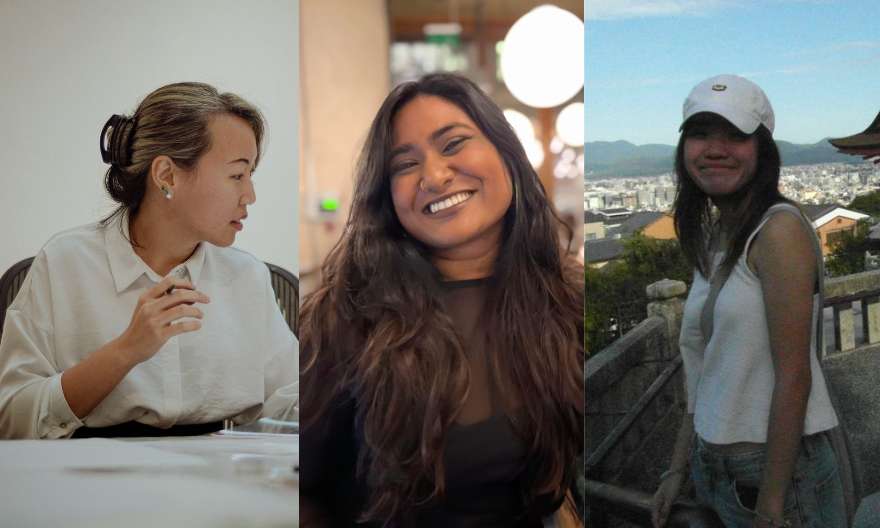Exploring the narratives of purposeful aging, global mental health, life and death
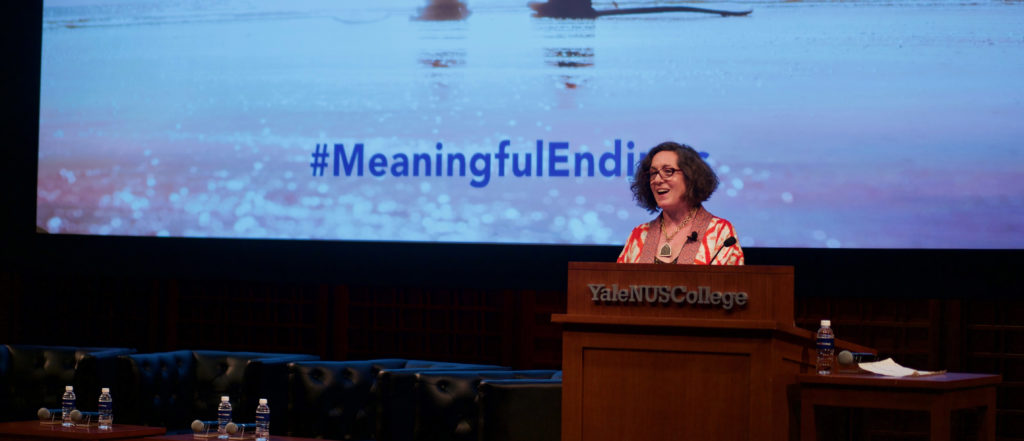
Visiting Professor of Social Sciences (Public Health and Psychology) Jeanette Ickovics who hosted the symposium titled ‘Purposeful Aging // Meaningful Endings: Art, Science and Innovation’.
In the month of April, Yale-NUS College hosted two events that looked at prevalent issues in today’s ageing society – purposeful aging, global mental health as well as life and death. The events demonstrated how such complex and interconnected issues require new and often interdisciplinary perspectives in order to address them. Such perspectives are a way of learning that the liberal arts promotes.
On 11 April 2018, Visiting Professor of Social Sciences (Public Health and Psychology) Jeanette Ickovics hosted a symposium titled ‘Purposeful Aging // Meaningful Endings: Art, Science and Innovation’ that was co-organised with Modern Aging Singapore and Singapore Hospice Council. The multidisciplinary symposium featured traditional keynote lectures and speaker panels, alongside artistic performance and participatory activities that sought to disrupt science, challenge conventions and transform beliefs about life and death.
The first keynote speech of the day was by Dr Elissa Epel, who is the director of the Aging, Metabolism, and Emotions Lab, and the Center for Obesity Assessment, Study, & Treatment, (COAST), and Associate Director of the Center for Health and Community at the University of California, San Francisco.
Noting that we are currently in an era where public health and medical advances have led to extended lifespans, she highlighted that there were disparities in length of life across populations within and between countries. Dr Epel went on to explain aging at a cellular level and the simple changes to our lifestyle one can make to stay disease-free longer.
“The length of our telomeres, the caps at the end of each strand of DNA that protects our chromosomes, have an inverse relationship with the onset of diseases like dementia and cancer. In addressing the question of ‘What shapes biological aging’, we have to consider the causal relationship of psychological stress on telomere length. For example, higher cortisol levels due to stress increases blood pressure and also wears down the telomere length.”
To slow down biological aging, she exalted the need for healthy eating. “Food is medicine. Consumption of large quantities of processed products and soda lead to potent changes in our body and are associated with shorter telomere lengths. Instead, one should consume food that are anti-oxidant and anti-inflammatory.”
Later in the day, there was a panel discussion that considered the personal and ethical dilemmas raised by Dr Ezekiel Emmanuel’s provocative essay titled ‘Why I hope to die at 75’. The panel featured three Yale-NUS College professors, namely Associate Professor of Humanities (Philosophy) Andrew Bailey, Associate Professor of Social Sciences (Sociology and Public Policy) Anju Paul and Assistant Professor of Philosophy Matthew Walker.
In addressing the underlying argument on the need for meaning and purpose beyond 75, Dr Walker commented, “There are two main things about meaning. The first is the productivity view – a life that is meaningful in virtue of achievement. The next is the all or nothing principle. When life lacks the meaning we aspire to have, then one should welcome death.”
In response to this, Assoc Prof Paul suggested that every individual has a different way of defining meaning and as such, aging can actually be a positive thing. Sharing a personal anecdote, she said, “75 is an arbitrary number. Thinking of my own father, he is close to 80 just like the author but is still a remarkably productive person. He has chosen to make this time in his life focused on training the next generation of doctors; it is a different way of contributing relative to when he was younger, but in no way any less significant.”
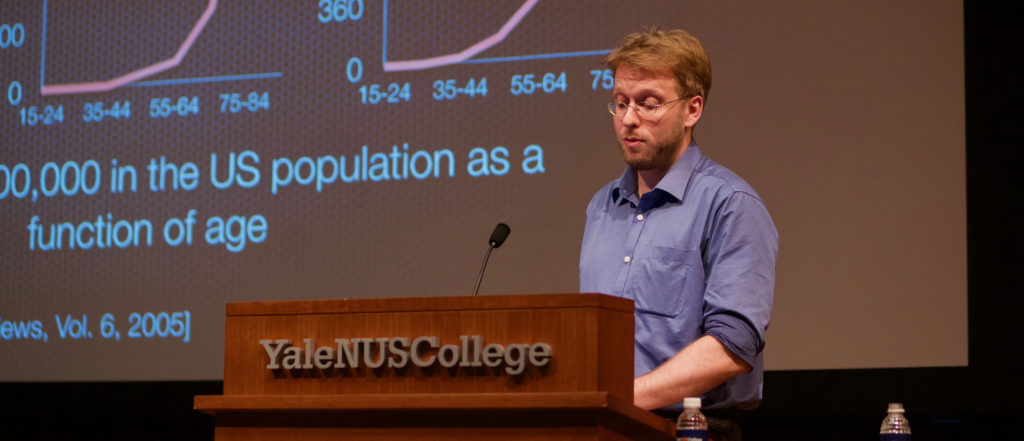
Assistant Professor of Science Jan Gruber looks at the science of aging.
Following 11 April’s symposium, the ‘Global Mental Health and Aging in Asia: Challenges to Families, Communities, Professionals and Institutions’ by Dr Arthur Kleinman kicked off the inaugural Dean of Faculty lecture series on 18 April 2018.
Dr Kleinman is the Esther and Sidney Rabb Professor of Anthropology in the Department of Anthropology at Harvard University. At Harvard Medical School, he is Professor of Medical Anthropology in Global Health and Social Medicine and Professor of Psychiatry. He has published seven books and co-edited multiple others regarding the research topics of culture and depression, SARS and AIDS in China, world mental health and caregiving amongst others.
In his lecture, Dr Kleinman sought to highlight how global aging intersects powerfully with mental health, particularly in China. For one, he identified that there is a large treatment gap for mental health in China where up to 200 million people do not receive help.
“There are a variety of reasons as to why it is a challenge to scale up mental health services in China. Available services are largely concentrated in urban psychiatric hospitals. General physicians and healthcare workers have little training in mental health services, and the general absence of knowledge about mental illness and negative stigma towards it prevent many sufferers from seeking needed care.”
Nonetheless, Dr Kleinman pointed out that there have been positive developments in mental health in China, such as the enactment of new mental health laws that improve the rights of the mentally ill and reforms to healthcare financing structures. Moving on, he presented the case for aging in China.
“By 2050, between 25 and 30% of the Chinese population will be over 65 years of age. This is happening at a time in which the social security system is not going to be adequate to meet the demands caused by this demographic change. The former one child policy, the increasing number of women in the workforce and changes in filial piety contribute to the growing crisis of elder care.”
This problem of aging is not one that only China faces but rather, it is a rising problem faced by countries like Japan, South Korea, Singapore amongst many others. As such, Dr Kleinman capped off his lecture with an enduring extolment of the importance of caregiving, one of the most pivotal, but yet, least addressed question for policy makers, programme directors and families in many Asian societies.
“Caregiving is invincible in society. We don’t compensate it except in the health domain. A large percentage of caregiving is in taking care of gardens, families, pets, communities we live in. Caregiving is the largest uncompensated area of social life. No society can work without caregiving. Sociologists and anthropologist have failed to project the importance of caregiving. It is precisely because of caregiving that we realise why social knowledge is important. It’s the American Hollywood idea that life is about resilience but the Chinese experience teaches us that life is about enduring the harshness of life. We will get a better sense of how and why we endure if we look into the elderly and caregiving.”

